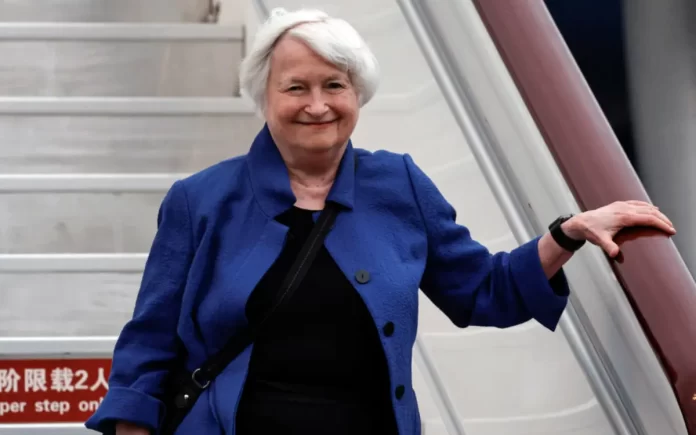Beijing: US Treasury Secretary Janet Yellen commenced a five-day visit to China on Friday, choosing one of the nation’s prime export and manufacturing centers as her starting point. Her mission: to advocate for fairness for American businesses and workers in the Chinese market.
Yellen emphasized to Guangdong provincial governor Wang Weizhong the importance of open and honest communication between the US and China, particularly in resolving areas of dispute, such as China’s industrial overcapacity, which poses concerns about global ramifications.
As the first Cabinet-level official to visit China since President Joe Biden’s meeting with Chinese leader Xi Jinping in November, Yellen hinted at addressing the US’s and European nations’ apprehensions regarding what they perceive as unfair trade practices by China.
Before her discussions with the governor, Yellen met with business executives from the United States, Europe, and Japan to understand their challenges operating in China. Her upcoming dialogues with senior Chinese government officials are anticipated to cover trade and other pertinent matters.
Also Read: U.S. Army Corps of Engineers to Open New Channel to Port of Baltimore
Addressing American business executives in Guangzhou’s Baiyun District, Yellen acknowledged the challenges faced by American companies in China. She cited a recent survey by the American Chamber of Commerce indicating that a third of American firms in China reported experiencing unfair treatment compared to local competitors.
Highlighting China’s unfair economic practices, including barriers to access for foreign firms and coercive actions against American companies, Yellen stressed the necessity to rectify these issues for the mutual benefit of both countries.
Guangzhou, as the capital of Guangdong province, plays a significant role in Chinese manufacturing and exports, housing major companies like Huawei and BYD. Huawei, in particular, has felt the impact of US restrictions on semiconductor exports to China, prompting Chinese efforts towards self-sufficiency and technological leadership.
While acknowledging uncontroversial economic interactions between the US and China, Yellen pointed out Chinese practices that disadvantage US firms, such as government subsidies fueling overproduction in sectors like solar panels and electric vehicles (EVs).
Also Read: Iran Mourns Fallen Officers in Embassy Strike, Vows Revenge
Despite the benefits of increased production in green technologies, concerns persist among Western governments about the potential inundation of their markets with low-priced exports, jeopardizing domestic jobs.
Yellen’s next destination is Beijing, where she is expected to urge China to promote domestic consumption, ensure fair competition in emerging technology sectors, and grant adequate market access to US companies.
Amid China’s rebuttals regarding overcapacity concerns and accusations of US interference with free trade, Yellen reiterated that addressing excess capacity is a shared concern among many countries and emphasized the need for policy adjustments to mitigate global economic risks.
Scott Paul, president of the Alliance for American Manufacturing, underscored the importance of using all available policy tools to prevent China’s industrial overcapacity from negatively impacting US economic and national security interests.
As discussions continue, Yellen stated that the US remains open to employing tariffs to counter China’s heavily subsidized manufacturing of green energy products, underscoring the seriousness of the issue.



